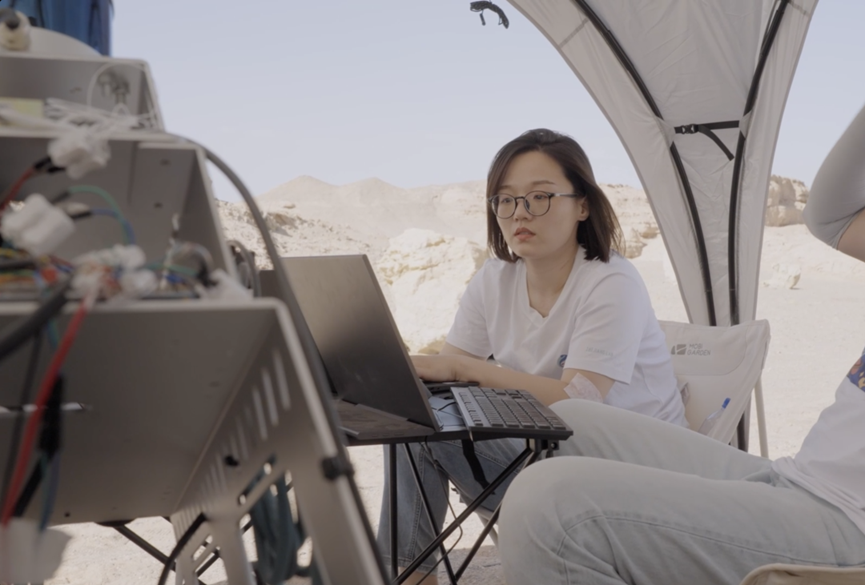

63 years ago, humans sent the first probe to Mars, casting our curious glance at the red planet. At this very moment, China's first rover Zhurong is driving on the surface of Mars, which symbolizes China's tinder for interstellar exploration. As one of the most Earth-like objects in our solar system, Mars represents the human desire for and exploration of outer space over 60 years.
At Zhejiang Lab, there is a woman whose research goal is to "fly" algorithms to Mars, making extraterrestrial detection more "intelligent".
She is LI Yuehua, a post-90s female researcher and a research specialist at ZJ Lab. After graduation in 2018, she joined ZJ Lab, and has since then been engaged in research on intelligent sensing, scene understanding, positioning and navigation technologies for unmanned detection systems in extraterrestrial environments such as Mars and the Moon.
On the occasion of International Women's Day 2023, LI Yuehua was awarded the title of National "Women Making Achievements" Pacesetter by the All-China Women's Federation.

"To put it simply, my goal is to make the Mars rover smarter, and so is the entire team." As the team leader, LI Yuehua managed a team of more than ten members with an average age of 29.
Isn't the rover "smart" enough? It starts with how the rover works. Mars is a desert planet in general, with dunes, gravel and craters all over the surface. At present, the rover needs to send back its perceived information such as landform to Earth as it is moving forward. After the staff judges and confirms travel safety, the command is sent back to the rover before it can take a step forward. In this process, sometimes, it took as long as 40 minutes to transmit just information in both directions.
"Now, the rover is like a baby. It can sense but cannot understand its surroundings. It doesn't know which terrain is dangerous and which environment allows for interactions, so it needs the help of researchers on Earth." LI Yuehua introduced, "We hope that the rover can judge independently and move safely and quickly using our algorithms."
The team set up a Mars-like proving ground for our daily work at ZJ Lab. However, in order to achieve algorithmic innovation, we have to get more field feedback data from earth surface conditions closer to Mars. It's just data and scenes about the surface of Mars. Are there any on Earth?
Based on limited image data from the Internet, LI Yuehua's team found a little-visited "no man's land" deep in the Dunhuang desert, which is very close to Mars' Yardang landform in terms of topography and light.
The team set off with instruments and devices. It was the end of summer in September, and the weather was still hot. The desert was roasting under the burning hot sun, and our feeling temperature reached as high as 40℃. In addition, some members who were exposed to direct sunlight for long periods had a nosebleed, and the instruments broke down under extreme heat. These uncertainties posed great challenges to algorithm testing and data collection.

"We did encounter a lot of unexpected difficulties, all of which could not be found in laboratories. But it is also a good thing, because problems expose deficiencies. We can adjust algorithms according to different scenarios, to improve their resilience and anti-risk ability." LI Yuehua is one of the two female members but she is the mainstay of the team in the face of these hardships and challenges. "There are setbacks everywhere, and we try to overcome them as they come. That's the way scientific research is done, and countless failures can turn into success, just like climbing."
At present, LI Yuehua has led the team to complete the construction of an intelligent sensing platform based on multi-sensor fusion for extraterrestrial detection, which initially realizes the consistent representation and multi-modal fusion of information from multiple sources and expands sensing dimensions and accuracy of extraterrestrial detectors.

In those days in Dunhuang, seeing the sunset and rising stars at the end of the test, we built a bonfire in the vast desert, went through the work and talked heart to heart. "If you see it was very hard work, I think that's right. However, having chosen this job, we definitely enjoy the process, because it is what we recognize and love." This is the inner voice of LI Yuehua and all the team members. They are devoted to this "no man's land", following their dreams and passion under the stars.














